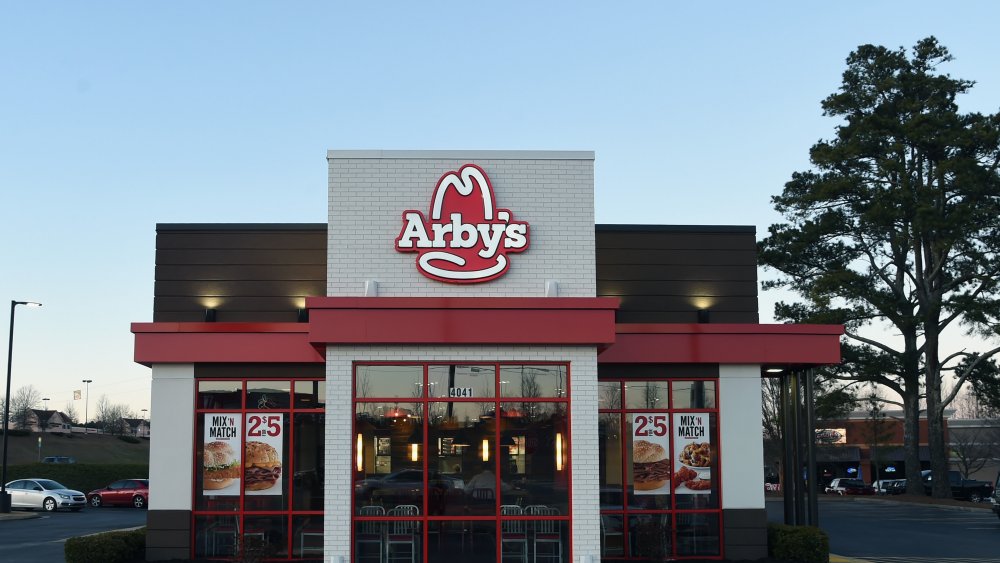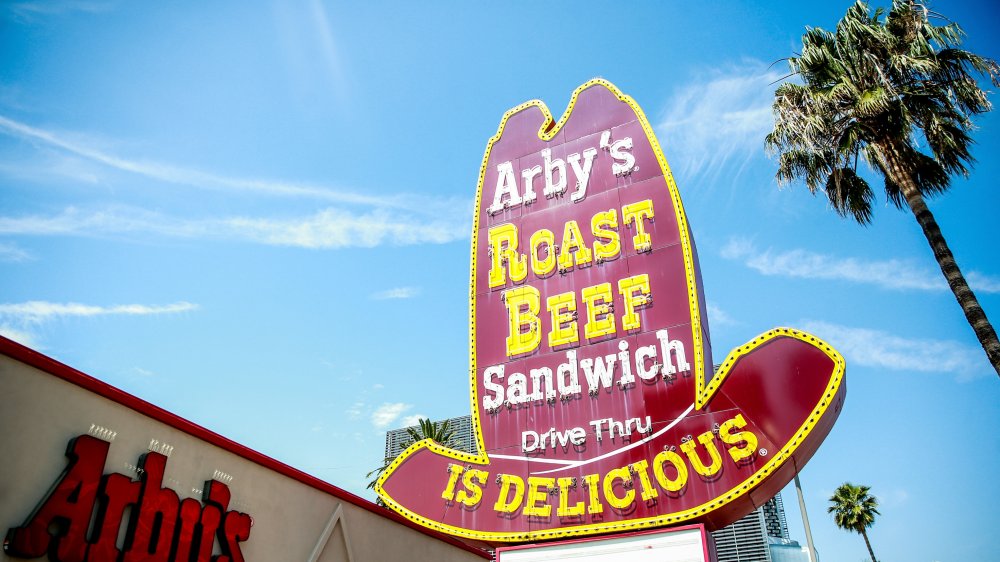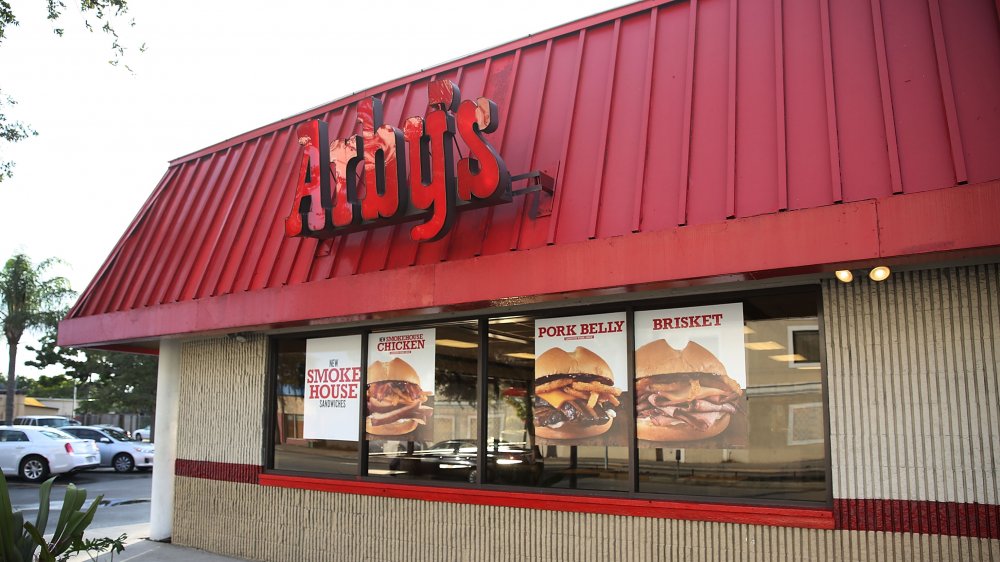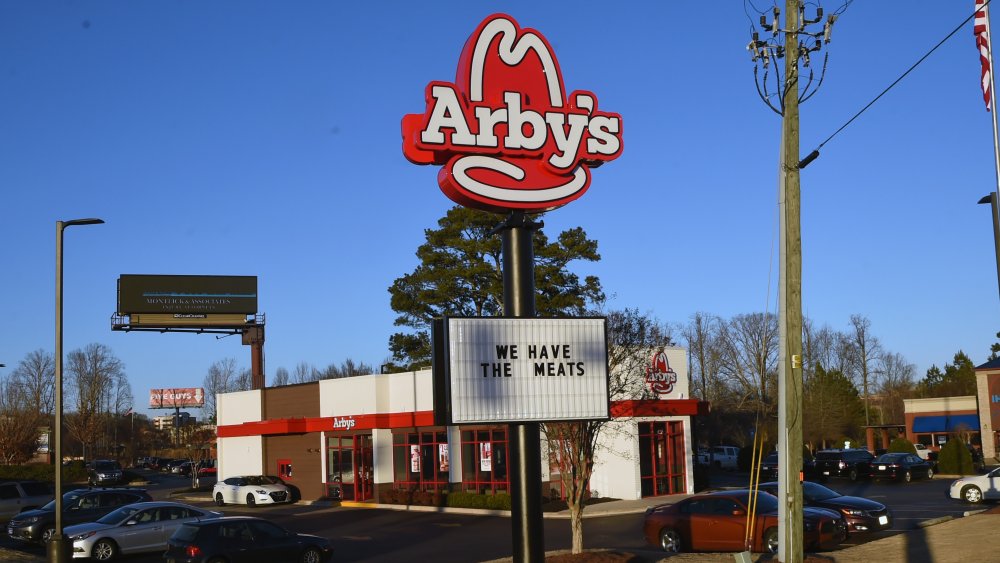Here's How Much It Really Costs To Open An Arby's Franchise
Arby's is one of America's favorite fast food sandwich chains. They "have the meats," according to award-winning actor Ving Rhames' voice in the brand's iconic commercials (via WKDQ). Arby's has been known for its roast beef sandwiches since Leroy and Forrest Raffel opened the first Arby's in 1964. They wanted to stand out in a sea of burger joints by offering something different: roast beef. They later added cheddar cheese sauce, red onion, and a toasted onion roll to the sandwich in 1978 (via Arby's).
Flash forward, and Arby's has started selling its famous meats by the pound, and adds limited-time options to attract a variety of customers, such as an upgraded prime rib sandwich, and chicken cheddar ranch sandwich. Today, the chain clearly wants to be seen as more than the place with roast beef. In fact, a campaign was launched called "Head of Sandwiches," the main purpose of which was to promote the other sandwich options available at Arby's. The campaign has been successful in attracting a younger consumer into the restaurant, according to Forbes.
What does it take to become an Arby's franchisee?
Did you know that baseball great Hank Aaron owned 10 Arby's franchises in the 1980's after retiring from baseball (via QSR)? Arby's is currently owned by one of the largest restaurant companies in the U.S., Inspire Brands. In addition to Arby's, Inspire Brands also owns Sonic, Buffalo Wild Wings, and Jimmy John's. All combined, there are more than 11,000 restaurants, 1,400 franchisees, and $14.6 billion in system sales within the group, according to the company. Inspire Brands has recently filed trademarks for names of possible ghost kitchens — which would offer delivery and takeout only — a move that could put them ahead of several quick service chains (via Restaurant Business).
If all this sounds enticing, here's what you'll need: The Arby's team expects all franchise candidates to have extensive multi-unit restaurant operator experience, as well as a desire to open multiple Arby's locations. You'll also need a minimum of $500,000 in liquid capital, and a net worth of at least $1 million. The estimated total investment is in the range of $314,550 to $1,844,200 (via Arby's).
What else is involved in owning an Arby's franchise?
Breaking it down further, according to Franchise Gator, Arby's initial license fee is $37,500 for the first restaurant unit, and $25,000 for each additional store. Royalty fees are an additional 4 percent of gross sales. National and local advertising are additional fees — 1.2 and 3 percent of gross sales respectively. Still on board? Let's keep going.
Arby's president Jim Taylor recently addressed 700 Arby's franchisees, telling them, "Arby's was born to be different. We're different because of the food we serve, the service experience we offer, and our bold, confident voice that breaks through with culture in a way that others in QSR don't" (via Inspire blog). How is Arby's innovating? Remember the pork belly sandwich, or the marrot, Arby's meat carrot? Arby's was also one of the first fast food chains to say it would never serve plant-based meat, according to Food & Wine.
Still on the fence? Let's look at a few more details about Arby's.
How Arby's franchisees in the news affect the company
As a franchisee of any corporation, what other franchisees do can trickle down to your stores. While you may own your own restaurants, you are still part of a big (possibly dysfunctional) family. For example, one Minnesota franchisee made news recently when they posted a sign stating, "Only well-behaved children who can keep their food on their trays and their bottoms on their seats are welcome. If you can't do this you will be asked to leave." Arby's ordered the franchisee to remove the sign and publicly issued an apology — but perhaps the PR damage was done.
Which brings us to our next point to consider. Could it be better to open your own independent restaurant in lieu of a franchise? There are pros and cons to both scenarios, according to McDonald Paper. As a franchisee, you benefit from branding, training, marketing, and ingredient sourcing, but also pay fees and royalties, lose some control as an owner, and are subject to scrutiny by the franchise. As an independent owner, you can control your own brand, marketing, menu and hours, but you also start with no brand recognition, resources, training, or access to suppliers.
So what did you decide? If you're interested in peddling those famous Arby's meats, alongside the popular, perfectly seasoned curly fries, submit a franchise application online at Arby's.



